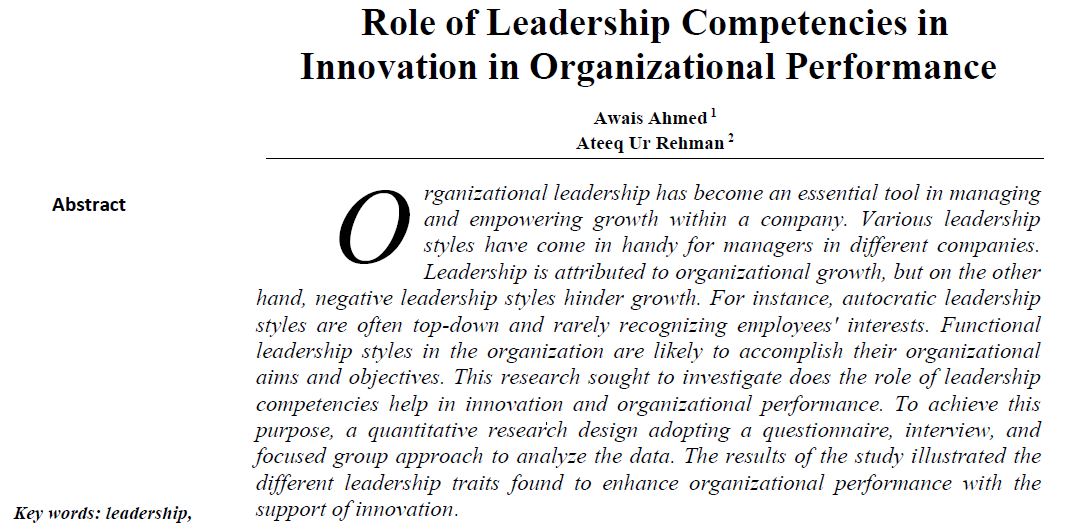Role of Leadership Competencies in Innovation in Organizational Performance
Abstract
Organizational leadership has become an essential tool in managing and empowering growth within a company. Various leadership styles have come in handy for managers in different companies. Leadership is attributed to organizational growth, but on the other hand, negative leadership styles hinder growth. For instance, autocratic leadership styles are often top-down and rarely recognizing employees' interests. Functional leadership styles in the organization are likely to accomplish their organizational aims and objectives. This research sought to investigate does the role of leadership competencies help in innovation and organizational performance. To achieve this purpose, a quantitative research design adopting a questionnaire, interview, and focused group approach to analyze the data. The results of the study illustrated the different leadership traits found to enhance organizational performance with the support of innovation.
Downloads
References
Łukowski, W. (2017). The impact of leadership styles on innovation management. Marketing of Scientific and Research Organizations, 105-136.
Leviss, K. G. (2016, December 20). The-5-Skills-That-Innovative-Leaders-Have-In-Common. Retrieved from Harvard Business Review: https://hbr.org/2016/12/the-5-skills-that- nnovative-leaders-have-in-common
Maurer, T. J., & London, M. (2018). From individual contributor to leader: A role identity shift framework for leader development within innovative organizations. Journal of anagement, 1426-1452.
Lang, D. H. (2018). The competencies of innovation leaders. Innovation Leadership, 15-28.
Julien, H. (1996). A content analysis of the recent information needs and uses literature. Library and Information Science Research, 18(1), 53-65.
Amabile, T., & Pratt, M. (2016). The dynamic componential model of creativity and innovation in organizations: Making progress, making meaning, in B. Staw& A. Brief (Eds.). Research in Organizational Behavior, 36, 157-183.
Baregheh, A., Rowley, J., Sambrook, S., & Davies, D. (2012). Innovation in the food sector SMEs. Journal of Small Business and Enterprise Development, 19(2), 300-321.
Bel, R. (2010). Leadership and innovation: Learning from the best in Global Business and Organisational Excellence. 29(2), 47-60.
Braha, K., Qineti, A., & Serenčéš, R. (2015). innovation and Economic Growth: The Case of Slovakia, in Visegrad. Journal on Bioeconomy and Sustainable Development, 4(1), 7-13.
Brem, A., Maier, M., & Wimschneider, C. (2016). Competitive advantage through innovation: the case of Nespresso, in Europe. Journal of Innovation Management, 19(1), 133-148.
Carmeli, A., Atwater, L., & Levi, A. (2011). How leadership enhances employees' knowledge sharing: the intervening roles of relational and organizational identification, in. The Journal of Technology Transfer June 2011, 36(3), 257-274.
Duan, S., Liu, Z., & Che, H. (2018). Mediating influences of ethical leadership on employee creativity, in. Social Behavior and Personality Volume, 46(2), 232-337.
Fawcett, S., Jones, & Fawcett, A. (2012). Supply chain trust: The catalyst for collaborative innovation. Business Horizons, 2, 163-178.
Feraru, G. (2017). Corporate Entrepreneurship As A Mechanism To Turn Innovation Into Competitive Advantage, in Annals Of 'Constantin Brancusi.' The University Of Targu-Jiu. Economy Series, 213-219.
Gumusluoglu, L., & Ilsev, A. (2009). Transformational leadership and organizational innovation: the roles of internal and external support for change,. Journal of Product Innovation Management, 26(3), 277.
Héroux, S., & Fortin, A. (2018). The moderating role of IT-business alignment in the relationship between IT governance, IT competence, and innovation. Information Systems anagement, 35(2), 98-123.
Hunter, S., & Cushenbery, L. (2011). Leading for change: Direct and indirect influences. Advances in Developing Human Resource, 13, 248-265.
Ikeda, K., Marshall, A., & Okamura. (2016). Four steps to re-ignite Japan’s innovation leadership. Strategy & Leadership, 44(6), 35-45.
Minh, N., Badir, Y., & Afsar, B. (2017). The impact of leaders' technical competence on employees' innovation and learning. Journal of Engineering & Technology Management, 44, 44-57.
Tien, W., & Cheng, C. (2017). Managing online creativity for improving innovation performance. Internet Research, 27(3), 670-690.
Zhang, M., Zhao, X., & Lyles, M. (2018). Effects of absorptive capacity, trust, and information systems on product innovation. International Journal of Operations & Production anagement, 38(2), 493-512.












